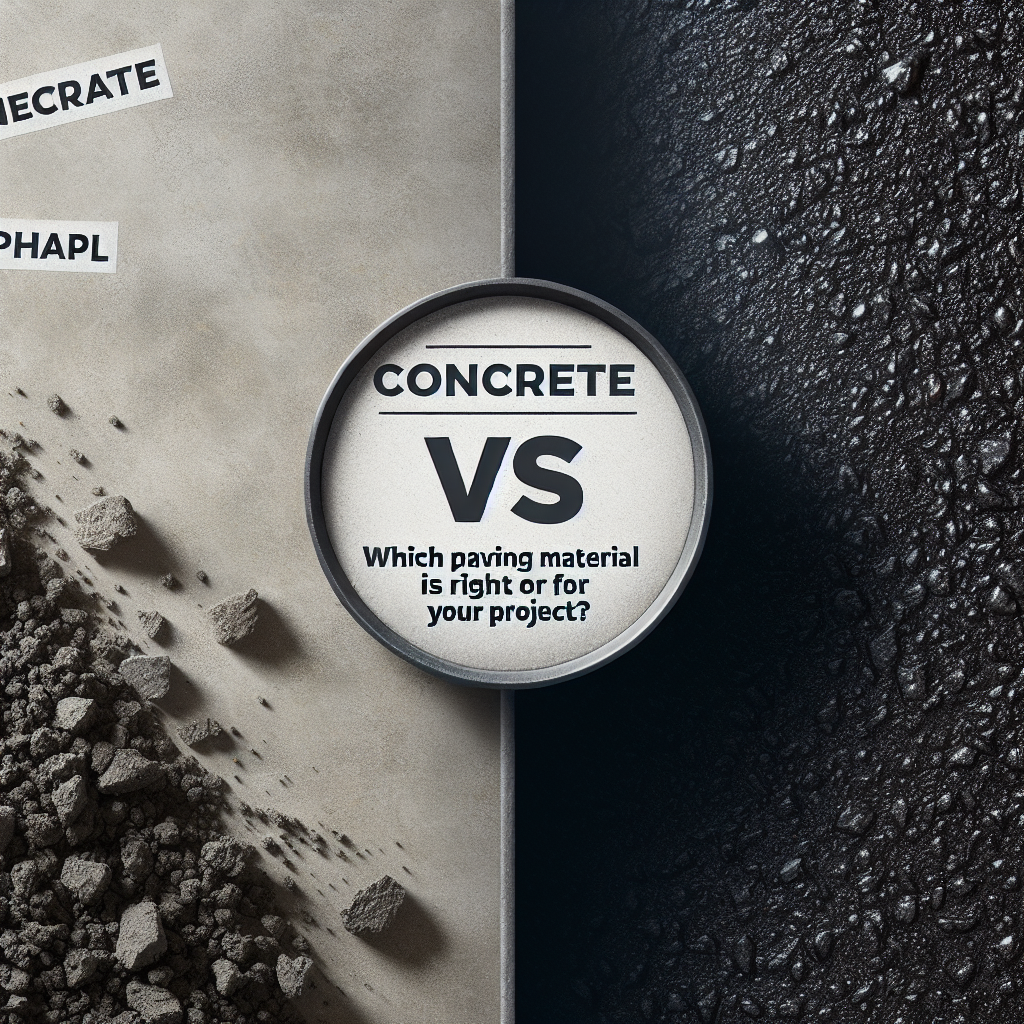When it comes to paving a driveway, parking lot, or road, the choice of material can be overwhelming. Two of the most common options—concrete and asphalt—each have their pros and cons. Understanding these can help you make an informed decision tailored to your specific project needs. In this article, we’ll delve into the differences between concrete and asphalt, helping you determine which paving material suits you best.
Understanding Concrete and Asphalt
What is Concrete?
Concrete is a composite material made from cement, water, and aggregates (such as sand, gravel, or crushed stone). When mixed and poured, concrete hardens into a durable surface that can withstand heavy loads and extreme weather conditions. It often comes in a grayish color but can be colored or stamped for aesthetic appeal.
What is Asphalt?
Asphalt is a mixture of bitumen (a sticky black substance) and aggregates. It is primarily used in road construction and parking lots due to its smooth, flexible surface. Asphalt pavement is generally black in color and can be laid quickly, making it an efficient choice for many projects.
Key Differences Between Concrete and Asphalt
Durability
Concrete: One of the standout features of concrete is its longevity. Properly installed concrete can last 30 years or more with minimal maintenance. It’s particularly resistant to heavy loads, which makes it ideal for driveways and commercial parking lots.
Asphalt: While asphalt doesn’t last as long—typically 15 to 20 years—it has the advantage of being easier to repair. Potholes and cracks can be filled with simple maintenance, making it a practical option for areas with heavy traffic.
Cost
Concrete: The upfront cost of concrete is generally higher than that of asphalt. Installation costs can range from $4 to $15 per square foot, depending on the complexity of the project and the region. However, its durability might balance this initial investment over the long run.
Asphalt: On the other hand, asphalt costs between $2 to $5 per square foot, making it a more budget-friendly option for many homeowners and businesses. Its quicker installation time also adds to its cost-effectiveness.
Maintenance
Concrete: While concrete is quite durable, it requires periodic sealing and can be prone to cracking if not properly maintained. However, it doesn’t require frequent resurfacing, unlike asphalt.
Asphalt: Asphalt surfaces typically need sealing every few years and may require more frequent repairs due to wear and tear. Regular maintenance can enhance its lifespan and appearance.
Aesthetic Appeal
Concrete: One of the areas where concrete shines is in design versatility. Stamped and colored concrete can be customized to fit your aesthetic preferences, making it an attractive option for decorative pathways or patios.
Asphalt: While asphalt has a more utilitarian appearance, its smooth surface can present a clean look. However, it typically offers fewer design options than concrete.
Environmental Impact
Concrete: Concrete production is energy-intensive and contributes to carbon emissions. However, its longevity means that it often doesn’t need to be replaced as frequently, potentially mitigating some environmental impacts over time.
Asphalt: Asphalt is a recyclable material and can be reused for road construction. However, it may release volatile organic compounds (VOCs) during installation, which can impact air quality.
Making the Right Choice for Your Project
When to Choose Concrete
- Longevity and Durability: If your project requires a surface that can withstand heavy loads and needs minimal repairs, concrete is the way to go.
- Aesthetics Matter: For projects such as sidewalks and patios, where appearance is crucial, concrete offers endless design possibilities.
- Climatic Considerations: In regions with extreme temperature fluctuations, concrete can handle thermal expansion and contraction better than asphalt.
When to Choose Asphalt
- Budget Constraints: If you’re looking for a more affordable paving option, asphalt is usually the better choice.
- Quick Installation: For projects that need to be completed rapidly, like commercial parking lots, asphalt can often be laid faster than concrete.
- Frequent Repairs: If your paving needs are in high-traffic areas that require regular maintenance, asphalt may beat concrete for convenience.
Conclusion: The Right Material for Your Needs
Choosing between concrete and asphalt involves careful consideration of various factors, including budget, aesthetics, climate, and maintenance requirements. While both materials have their pros and cons, understanding your specific project needs will guide you to the right choice.
Whether you opt for the long-lasting durability of concrete or the budget-friendly and quick-install nature of asphalt, either paving material can serve you well with proper installation and maintenance. So take a moment, assess your project requirements, and pave the way to a successful outcome!


